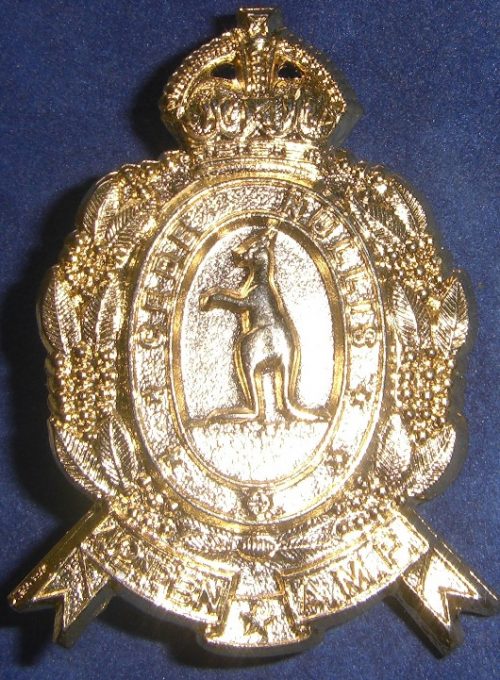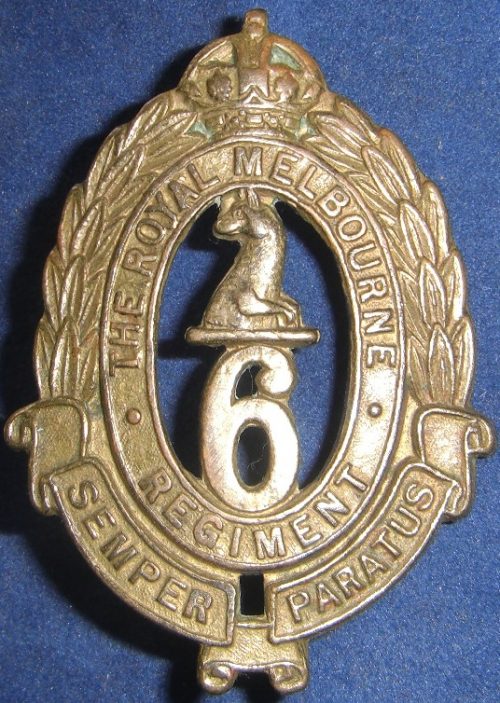Description
Description: 42nd Battalion (The Capricornia Regiment) – Reproduction Hat Badge – 1930 to 1942
Maker’s Name: N/A
Condition: Very Good
Comments: 42nd Battalion (The Capricornia Regiment) – Reproduction Hat Badge – 1930 to 1942
Complete with 2 pins – Note – This is a reproduction of the original hat badge.
After the First World War the defence of the Australian mainland lay with the part-time soldiers of the Citizens Military Force, also known as the Militia. The Militia was organized to maintain the structure of the First AIF and kept the same numerical designations. The Militia units were distributed in the same areas the original AIF units were raised. Consequently, Militia units were also known by the name of their shire. Thus, Queensland’s 42nd Infantry Battalion was the “Capricornia Regiment”, with training centres in Rockhampton, Mt Morgan, and, for a while, Gladstone and Mackay. The unit also drew men from Sarina, Carmilla, and Yeppoon.
From the start of the Second World War until 1941 the 42nd held frequent training camps at Yeppoon. In March 1942 the battalion moved to Tiaro, near Maryborough, where it joined the rest of the 5th Division’s 29th Brigade. In early 1942 the brigade moved to Townsville, where it prepared defensive positions from Giru to Rollingstone. The brigade later conducted jungle training at Mt Spec, near Townsville.
In January 1943 the brigade was sent to Milne Bay. In mid-July the 42nd was sent to Buna and Boisi, before moving to Morobe at the end of the month. In August the battalion began moving to Nassau Bay, then Tambu Bay to take part in the Salamaua Campaign. On 9 September the 42nd captured Charlie Hill, allowing the Australians to capture Salamaua three days later.
In early 1944 the brigade linked up with the 7th Division in order to clear the Japanese from Lae. After spending several months patrolling the area, the 15th was transferred to Young’s Crossing near Petrie in June. It is worth noting that until August 1944 the brigade had the record for the longest service in New Guinea, having been there for 18 months.
At Young’s Crossing the 42nd was given some well-earned leave before the 29th Brigade was sent to Bougainville to become part of the 3rd Division.
On Bougainville the 29th Brigade opened the campaign in the Southern Sector. At the end of December the 15th Battalion made the initial advance, moving down the coast from the Jaba to the Tavera Rivers. The rest of the 29th Brigade – the 47th and 42nd Battalions – came into action in January 1945. On 17 January, a patrol from the 42nd entered Mawaraka, which was abandoned. Occupying the village, the 42nd began patrolling forward. Because of the frequent clashes with the Japanese and the miserable environment the brigade’s campaign is aptly known as the “battle of the swamps”. Having reached Mawaraka the 29th Brigade was relived by the 7th Brigade and returned to Torokina.
At the start of July the 29th Brigade relieved the 15th Brigade along the Mivo River. The 47th placed a company on the Mivo, along Lawne’s Track. The 42nd took up position along the Buin Road, between Mobiai River and the Nana Creek. The 15th Battalion was the furthest forward at Sisikatekori with two companies along Killen’s Track. The 29th Brigade advance to capture the Silibai River was postponed from 3 July until 10 July because of dogged Japanese resistance. The Japanese were eventually cleared. By the end of July and despite the heavy rain, the 42nd established patrol bases on the Mivo and reached the Oamai River. However, by that time the war was over.
The 42nd was disbanded on 7 May 1946.




